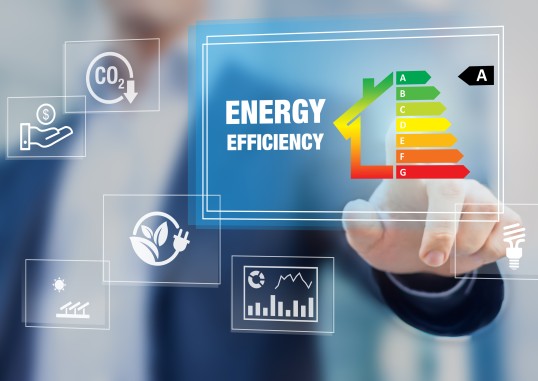- Artificial Intelligence (AI)
- Occupational exposure limit values
- Climate Change and Occupational Safety
- List of CMR substances
- Ergonomics
- EU GHS Regulation
- Industrial Security
- Collaborative robots
- Noise
- Nanoparticles at the workplace
- REACH
- Reference materials
- Proficiency testing
- Radiation
- Vibration
- Virtual reality
- Work 4.0
Energy efficiency

Source: Nicolas Herrbach - stock.adobe.com
Background
Besides the transition to the low-carbon economy (decarbonization), energy efficiency is crucial to the attainment of the climate goals. At the end of 2023, the UN Climate Change Conference therefore reached an agreement that the improvement in energy efficiency should double year on year. Germany’s Energy Efficiency Strategy 2050 (EffSTRA) sets a 30% reduction in primary energy consumption by 2030 (from a 2008 baseline) as the national energy efficiency target. The measures required for this purpose are compiled in a National Action Plan on Energy Efficiency (NAPE 2.0), which includes the sectors of buildings, industry, the craft trades, commerce and services, transport and agriculture. As a cross-industry sector and owing to its major potential for energy savings, the IT sector can support the other sectors in achieving their energy efficiency targets.
Work of the KKA at the IFA
Efforts to improve energy efficiency in the buildings sector often entail demolition, renovation and maintenance work, which can result in exposure to hazardous substances. The focus particularly lies on exposure to respirable quartz dust and asbestos; exposure to end-of-life mineral wool insulation materials, wood preservatives, polychlorinated biphenyls (PCBs) and polycyclic aromatic hydrocarbons (PAHs) is also frequent, however. The IFA conducts consultations and measurements for exposure to hazardous substances and also provides advice on technical and personal protective measures to be taken during work involving hazardous substances.
In the area of programming, energy efficiency not only conserves resources, but also increases safety. The more efficient the software produced and the fewer lines of code it contains, the lower the risk of security vulnerabilities, and the more resistant the code is to attack. Sustainable programming thus consumes fewer resources when the code is used, and the resulting clearer and more comprehensible code is also easier to maintain. This in turn extends the software’s service life.
Contact

Competence Centre for Climate Change and Occupational Safety and Health at the IFA
Email: kka@dguv.de
Contacts:
Angelika Hauke
Tel.: +49 30 13001-3633
Exposure to hazardous substances:
Dr Renate Beisser
Tel.: +49 30 13001-3310
Protective measures:
Dr Simone Peters
Tel.: +49 30 13001-3320
Christoph Thelen
Tel.: +49 30 13001-3330
Sustainable programming:
Jonas Stein
Tel: +49 30 13001-3555
Further Information

Further information from the DGUV on this topic:
Trend description in the Risk Observatory’s trend portal: Energy efficiency